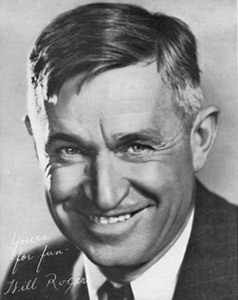"Will Rogers dies in a plane crash"

I don't think any of us are quite old enough to remember seeing those headlines in 1935, but over 80 years since that tragic day, the legend of Will Rogers lives on.
A key backer of American aviation, he was exploring Alaska with pilot Wiley Post, when their plane sputtered and stopped soon after takeoff and made a nosedive into a lagoon near Point Barrow. Both Rogers, the country’s “cowboy philosopher,” and Post, the one-eyed airman and the first pilot to fly solo around the world, died on impact.
At the time of his death on August 15th 1935, he had the most popular Sunday evening radio show, his newspaper columns were read by millions in the country and he was the second biggest motion picture box office draw.
Today, schools, highways, an airport and a shrine to the sun in Colorado Springs, Colorado, are named after him - and every year to mark the anniversary of his death, more than 100 planes fly into a grass landing strip near his childhood home.
So how did Will Rogers become so famous?
His life began in 1879 on the Cherokee Nation in Oklahoma, where part of growing up was learning roping skills and developing a deep love for horses.
In fact, he began his show business career by displaying those roping skills in Vaudeville and the popular Wild West shows of the era. An early foray into radio was on The Eveready Hour, which premiered in 1923 and featured him in a single performance where he was paid an unheard of amount of $1,000.
However, Will Rogers thought that radio was “bunk.” He didn’t believe that anyone could hear him and asked people to let him know if they could, so it was pretty ironic that later, in 1930, he would have his own radio show - a combination of his own brand of philosophic humor, music and a variety of other popular radio subjects.
By 1935, his weekly radio broadcast had become the most listened to program in the country, and an estimated 40 million people read his “Daily Telegrams,” published by The New York Times and syndicated to hundreds of other newspapers throughout the U.S. and Canada.
He is perhaps best known for his 1931 radio broadcast, in which he criticized US leaders for not adequately addressing the country’s unemployed population, which was then at 7 million people. You can read more about, and listen to that broadcast, in a previous RUSC editorial entitled Bacon, Beans and Limousines.
He was an incredible man, who according to historians at the Will Rogers Memorial Museum, had written six books and more than 3,600 articles, had traveled around the world three times, made 71 movies, and entered the Guinness Book of World Records for throwing three lassos at once, landing around a horse’s neck, its four legs and the horse’s rider - and all before the age of 55. One can only imagine how much more he would have contributed to the world...
You can listen to The Autobiography of Will Rogers from the Hallmark Playhouse on RUSC. In this special broadcast, James Hilton and his guests, along with Will Rogers' son, share with you the pleasure of hearing again some of the wisest and wittiest words that have been spoken in our lifetime. This is the story of the cowboy and entertainer of whom it was said, "he never met a man he didn't like."
Happy listening my friends,
